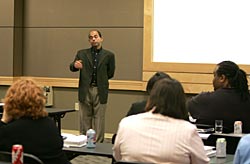REDMOND, Wash., June 3, 2005 — Executives from many leading U.S. community organizations are gathered in Redmond this week for Microsoft’s first Community Partner Leadership Summit. The event – which began Thursday and continues today — aims to strengthen relationships and deepen partnerships between Microsoft and leaders from national community organizations, professional groups and government and media organizations that focus on diversity and issues related to social, economic and political equality for women and minorities. The summit is also designed to create a national forum where Microsoft and community organization leaders can share ideas about how technology can be better utilized to help meet the needs of diverse and underrepresented groups.

Sailesh Chutani, director of Worldwide University Relations for Microsoft Research, addresses the Community Partner Leadership Summit, Redmond, Wash., June 2, 2005.
Presidents from more than 20 U.S. organizations attended the Community Partner Leadership Summit, including Dennis Courtland Haynes of the NAACP (National Association for the Advancement of Colored People); Dr. Don Tharpe, president of the Congressional Black Caucus Foundation, and Susan Phillips Bari from the Women’s Business Enterprise National Council. CIOs in attendance included Tarqi Muhammed of Black Enterprise Magazine, DeAnna Vasquez of the Congressional Hispanic Caucus and Karen Horting from the Society of Women Engineers.
Technology Partnership for Small Business
Also at the conference is Ronald N. Langston, national director of the Minority Business Development Agency (MBDA). On May 23, he announced that his agency and Microsoft had joined together to launch the Technology Partnership for Small Business Taskforce, a collaboration between IT industry leaders, elected officials and community organization representatives that was created to address the disparity in technology adoption by minority- and women-owned businesses.
“The Minority Business Development Agency is delighted to represent the U.S. Department of Commerce and the President of the United States at this Summit,” said Langston. “MBDA has made the growth of minority business enterprises a national priority and appreciates Microsoft taking a strong leadership role in helping diverse communities leverage technology in their businesses. Working together we will make a difference.”
Microsoft’s Vision for Working with Diverse Communities and Businesses
The first day of the Community Partner Leadership Conference featured executive briefings from Microsoft executives, including Ron Markezich, chief information officer; Sailesh Chutani, director of Worldwide University Relations for Microsoft Research, and Cindy Bates, general manager, Microsoft Small Business. The briefings explored current and future technologies at Microsoft, and provided community leaders with in-depth information on the company’s strategy and vision for working with diverse communities and businesses. The overall goal of the sessions was to give community leaders a better understanding of Microsoft’s commitment to diversity and the role the company can play in helping community organizations meet their goals.
“While Microsoft’s activities and relationships with diverse organization have included a broad range of technical grants and sponsorships, this is the first time we’ve brought our community partners to campus in formal way to help them understand who we are as a company,” said Claudette Whiting, Microsoft senior diversity director. “One of our major goals is to engage in a dialogue with community leaders to understand if our current programs continue to be the right programs and, if not, to find out how we can better serve them.”
The highlight of today’s agenda of the Community Partner Leadership is a town hall-style panel discussion on the impact of technology on economic development, education and empowerment for minorities and women. Moderated by Omar Wasow, executive director of BlackPlanet.com and a technology correspondent for NBC-TV, the discussion centers on the impact of technology on diverse communities and on opportunities for increasing technology adoption for minorities and women.
Greater Efficiency, Effectiveness
According to Whiting, the Community Partnership Leadership Summit is an important step in Microsoft’s efforts to expand the way it works to support community organizations. Where in the past the company has focused on helping to bridge the digital divide by making technology more readily available to underrepresented communities, there is a new emphasis on working with community organizations to enable them to use to technology deliver their programs with greater efficiency and effectiveness.
“If you look at nonprofit organizations, they have the same communication and productivity challenges that our enterprise customers face,” said Whiting. “We have great products and technologies that can help them overcome these challenges. We want to continue to work with community organizations to help bridge the technology gap. But we also want to expand the scope of our work in order to help community organizations apply the power of technology to the task of fulfilling their organizational goals.”




